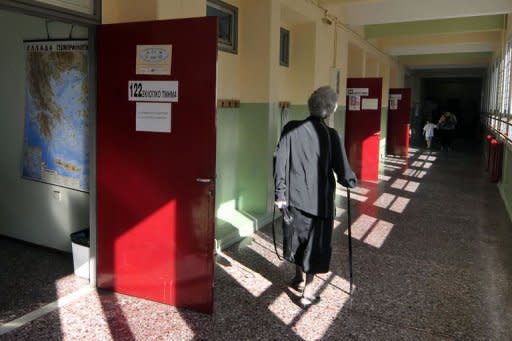Greek pro-bailout parties win knife-edge elections
Greece's two main pro-bailout parties clinched enough votes to form a government in knife-edge elections on Sunday, as world powers pushed for a new cabinet as soon as possible to ease global fears. "Today the Greek people expressed their will to stay anchored with the euro," said Antonis Samaras, the leader of the conservative New Democracy party which preliminary official results showed in the lead with 30.04 percent. "We ask all political forces which share the aim of keeping the country in the euro... to join a government of national unity," he said. "The country does not have a minute to lose." Samaras also pledged to honour Greece's commitments but says he wants to ease the terms of an unpopular EU-IMF bailout deal which has imposed harsh austerity on many Greeks in return for a multi-billion rescue package. The International Monetary Fund is pressing for urgent talks with Greece as early as next week and the Eurogroup in Brussels urged parties to move "rapidly" to set up a new government that would implement key reforms. "We hope this election will lead quickly to the formation of a new government that can make timely progress on the economic challenges facing the Greek people," White House spokesman Jay Carney said in Washington. International financial markets are watching the election closely because of its potential domino effect on other weakened eurozoneeconomies and some analysts warn Greece may eventually have to leave the euro anyway. Samaras's main rival Alexis Tsipras, head of the leftist anti-austerity party Syriza, conceded defeat and ruled out joining any coalition. "We represent a majority of people opposed to the bailout deal," said Tsipras, whose party came second with 26.57 percent of the vote. Coalition talks are now expected to start Monday, with the most likely ally for New Democracy being the socialist Pasok party. The two have dominated Greek politics for decades and are blamed by many for the current woes. With the sense of crisis hanging over Greece, there was little celebration for New Democracy on the streets of Athens. Only around 100 supporters greeted Samaras in central Syntagma square. "I feel really relieved and very happy. It's good for the country, for the stability of the country and the stability of Europe," said Louisa, a young supporter. Spiros Stamoulis, 26, said: "The majority of Greek people are very suspicious, very hesitant. They wait and see what the new policies will be before being optimistic about the future, and I understand." The preliminary results appeared to heed an unprecedented warning on the eve of the vote from German Chancellor Angela Merkel who said it was "extremely important" that Greeks choose lawmakers who would abide by the bailout. As the first results filtered through, Germany said it could discuss giving Greece more time to meet budget targets and Belgium said there was "room for manoeuvre" while France said Europe should "accompany Greeks towards growth." "There needs to be discipline but there also needs to be hope," French Foreign Minister Pierre Moscovici said in an interview with France 2 television. New Democracy would hold 130 seats in Greece's 300-seat parliament because of a 50-seat boost for the victor under the Greek system, the early results showed. Syriza would hold 71 seats and the pro-bailout Pasok party 33 seats. The neo-Nazi party Golden Dawn, which has been condemned for violent attacks and won votes on a wave of anti-immigrant sentiment, would win 18 seats. Pasok leader Evangelos Venizelos said he was ready to join with New Democracy but only on condition that other leftist parties were included. Venizelos said the new government should be one of "national responsibility." Analysts say Pasok is concerned about instability if a narrow majority is called on to pass unpopular reforms under pressure from street protests. Exit polls had shown a dead heat between New Democracy and Syriza which could have left Greece in the political gridlock between bickering parties which followed elections last month and triggered this vote just six weeks later. Greece has been forced to seek bailouts twice, first for 110 billion euros in 2010 and then for 130 billion euros this year plus a 107 billion euro private debt write-off -- for a total of 347 billion euros ($439 billion). Greek newspapers said the vote was the most critical since the end of military rule in 1974. For many Greeks a fine-tuning of the terms of the bailout may not be enough as public anger is rising against the steep pay and pension cuts seen since the crisis first exploded in 2009, setting off a chain reaction across Europe. Greece is now in its fifth year of recession, prompting many young Greeks to vote with their feet by emigrating, while local media warn the state will run out of cash to pay public-sector salaries and pensions on July 20. The ballot passed off mostly smoothly although a ballot box was set on fire in the radical Exarchia district of Athens and two grenades were found outside the offices of private media group Skai TV, which supports the austerity drive.






